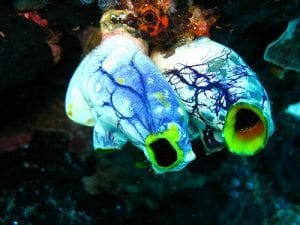Compound in Pacific Sea Squirt Kills Mesothelioma Cells
 There is new evidence that compounds isolated from a sea squirt found in the waters off of the Indonesian coast may hold the key to fighting mesothelioma and several other malignancies.
There is new evidence that compounds isolated from a sea squirt found in the waters off of the Indonesian coast may hold the key to fighting mesothelioma and several other malignancies.
The potential anticancer and antimicrobial properties are found in polysulfur aromatic alkaloids found in a Pacific sea squirt whose scientific name is Lissoclinum badium.
In a new article in the Journal of Natural Products, researchers from Japan’s Tohoku Medical and Pharmaceutical University and Sam Ratulangi University in Indonesia say they’ve discovered how these compounds may kill certain kinds of cancer cells, including pleural mesothelioma.
Their research could open the door to formal testing and, eventually, new and more effective mesothelioma treatments and longer survival.
Anticancer Properties of Marine Life
Cancer drug discovery research based on marine organisms from Eastern Indonesia is not a new phenomenon.
In 2015, researcher Yosmina Tapilatu of the Deep Sea Research Center at the Indonesian Institute of Sciences published an extensive paper on the status of such research dating back to the 1990s.
The paper includes a list of marine organisms from sponges and corals to seaweeds and sea squirts like Lissoclinum badium that produce compounds with anticancer properties. Alkaloids like the compound used on mesothelioma cells in the new study are among the most common pharmacologically active compounds found in these organisms.
Testing the Sea Squirt Compound
To evaluate the potential of these alkaloids to combat cancer, the research team first tested them on different cancer cell lines in the laboratory including colon cancer cells, cervical cancer cells, breast cancer cells and pleural mesothelioma cells.
They found that one alkaloid in particular – Lissoclibadin 1 – was the most toxic to all of the cells, including the mesothelioma cells. The compound induced mesothelioma cell death (apoptosis) by reactivating a cell-death signaling pathway that is often turned off in cancer cells.
With the promise of the compounds validated in vitro, the team moved on to testing in live mice that had been infected with colon cancer.
“In vivo studies demonstrated that [Lissoclibadin 1] suppressed tumor growth in nude mice carrying HCT-15 cells without significant secondary adverse effects,” states the paper’s first author Takeo Tatsuta with Tohoku University.
Hopeful News for Mesothelioma Patients
The news that these compounds killed cancer cells without causing serious side effects is especially exciting for mesothelioma patients since current treatments including chemotherapy, surgery, and radiation often cause complications and are only marginally effective at extending mesothelioma survival.
The report concludes that Lissoclibadin 1 “has potential as a chemotherapeutic candidate” for pleural mesothelioma and other cancers and should be investigated further in preclinical trials.
Currently, Alimta (pemetrexed) is the only chemotherapeutic agent approved by the FDA specifically for the treatment of mesothelioma.
Sources:
Tatsuta, T, et al, “Lissoclibadin 1, a Polysulfur Aromatic Alkaloid from the Indonesian Ascidian Lissoclinum cf. badium, Induces Caspase-Dependent Apoptosis in Human Colon Cancer Cells and Suppresses Tumor Growth in Nude Mice”, February 9, 2017, Journal of Natural Products, Epub ahead of print
Tapilatu, Yosmina, “Status of Drug Discovery Research Based on Marine Organisms from Eastern Indonesia”, March 18, 2015, Procedia Chemistry, pp. 484-492





